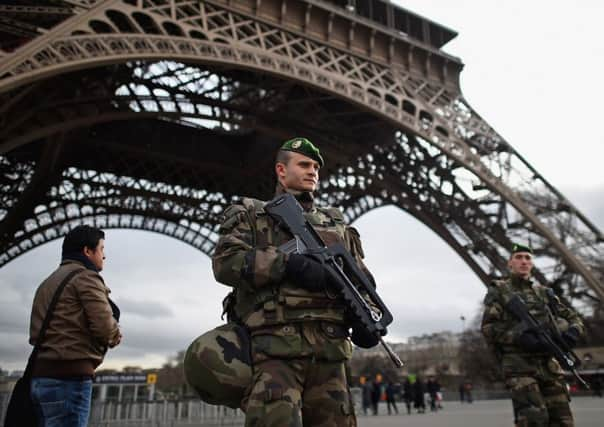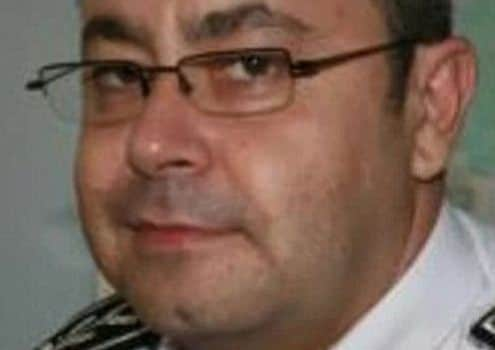French police chief’s suicide after Paris attacks


Helric Fredou reportedly took his own life in his office with his police-issue gun on Wednesday night in Limoges, central France.
Colleagues told French media outlets that he was “depressed” and overworked, and said he was single and had no children.
Advertisement
Hide AdAdvertisement
Hide AdMr Fredou, 45, began his career as a police office in 1997 and had been the deputy director of the regional police since 2012.


It is understood that shortly before committing suicide he had met the family of one of the victims of the massacre.
His body was found by a colleague at 1am on Thursday, hours after the terror attack at the satirical magazine’s office that left 12 people dead.
France’s national police union expressed its “sincere condolences” over the death and said: “On this particular day of national mourning, police commissioners are hit hard by the tragic death of one of their own.”
France is today to deploy 10,000 troops to protect vulnerable targets, after the country’s prime minister confirmed yesterday there was “without doubt” an accomplice to the supermarket shootings which killed four hostages on Friday.
Defence minister Jean-Yves Le Drian said that the troops would be in place by this evening , while the country’s 717 Jewish schools will also receive specialist protection. Security forces are already protecting a number of sensitive areas, including mosques. By midday yesterday, Paris’ Marais – one of the country’s oldest Jewish districts as well as a major tourist site – was filled with police and soldiers.
Meanwhile, there have been more than 50 anti-Muslim incidents in France in response to last week’s attacks which left 20 people dead, authorities said.
“The threats remain and we have to protect ourselves. It is an internal operation that will mobilise almost as many men as we have in our overseas operations,” Mr Le Drian said. “It is the first time that we have seen a mobilisation of this magnitude.”
Advertisement
Hide AdAdvertisement
Hide AdHe added: “We have decided to mobilise 10,000 men who will be placed to protect vulnerable points in the whole of the country from [Tuesday] evening.”
Prime minister Manuel Valls also confirmed that gunman Amedy Coulibaly had not acted alone when he held up a kosher grocery store in Paris. Coulibaly was killed by police officers at the end of a stand off on Friday, which took place at the same time that brothers Cherif and Said Kouachi held a hostage at a printing plant outside of Paris.
The brother of one of Coulibaly’s victims yesterday paid tribute to him as a “hero”. Yoav Hattab, 21, the son of the Chief Rabbi of Tunis, who was studying in Paris, snatched a gun put aside by Coulibaly during the stand off, not knowing that the weapon was broken and that the gunman had a second.
Avishai Hattab said: “I want to say that my brother is a hero. He was a hero. “
The siege came two days after satirical newspaper Charlie Hebdo was targeted by the Kouachi brothers in a dramatic massacre, killing 12 people and injuring nearly a dozen more.
“I don’t want to say much about the attacks, these barbaric acts of terrorism, but the work of the justice system and investigators continues,” said Mr Valls.
“We consider that there are, in all probability, accomplices.”
Forensic tests have revealed that Coulibaly, who was deemed a suspect in the murder of policewoman Clarissa Jean-Philipe on Thursday last week after his DNA was found to match that of a balaclava abandoned at the scene, has also been linked with a shooting of a 32-year-old man jogging in a park in the Paris suburb of Fontenay-aux-Roses on Wednesday.
Advertisement
Hide AdAdvertisement
Hide AdVideo emerged on Sunday of Coulibaly explaining how the attacks would unfold. The video was not broadcast until after the attacks were over. Police want to find the person who shot and posted the video which was edited after the attacks were over.
In the video, the man believed to be Coulibaly, says: “The bros of our team split into two; [They went to] #Charlie Hebdo… I left to face the police.”
Survivors say the Kouachi brothers claimed they were from al-Qaeda in Yemen. In the video, Coulibaly pledges allegiance to the Islamic State group, which has taken over large sections of Iraq and Syria.
Ties among the three attackers date back to at least 2005, when Coulibaly and Cherif Kouachi, 32, were jailed together. It later emerged that Cherif’s older brother, 34-year-old Said, fought with or was trained by al-Qaeda in Yemen.
Cherif was also convicted in 2008 along with several others of belonging to a network that sent jihadis to fight American forces in Iraq.
Since last week’s attacks, Israeli prime minister Benjamin Netanyahu has encouraged European Jews to move to the Jewish state.
But European Jewish groups have attacked the suggestion.
Rabbi Menachem Margolin, director of the European Jewish Association, said that he regretted that “after every anti-Semitic attack in Europe, the Israeli government issues the same statements about the importance of aliyah [immigration to Israel], rather than employ diplomatic means to strengthen the safety of Jewish life in Europe.”
Meanwhile, the first edition of Charlie Hebdo to be published since last week’s attacks is due out tomorrow and will include cartoons depicting the prophet Mohammed, the magazine’s lawyers have said. A print run of one million is expected.